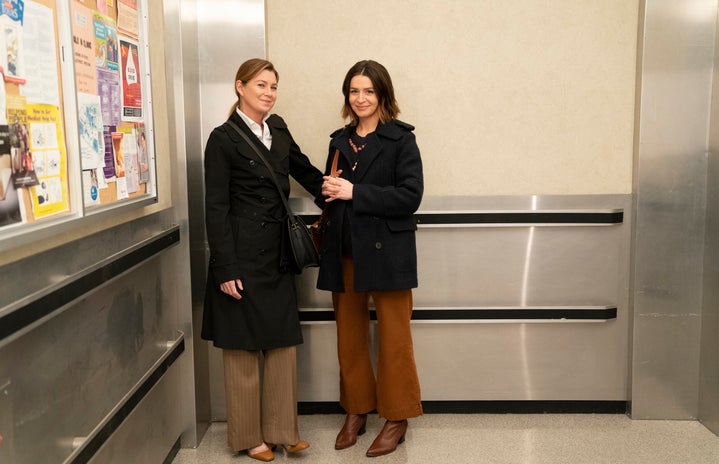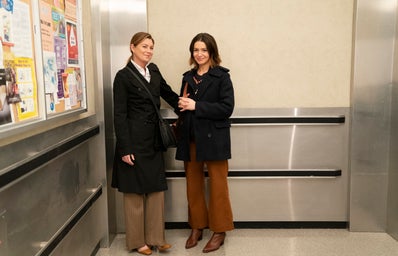It’s fair to say that Grey’s Anatomy, with 387 episodes so far, has revolutionized popular culture, right? But, actually, the most revolutionary thing about the medical drama is the women behind it. The group of women responsible for creating this show have changed how television dramas look, forever. From Shonda Rhimes to Ellen Pompeo, here are a few of the women behind one of the biggest shows in television history.
Grey’s Anatomy first premiered on ABC in 2005 and quickly became a massive hit. Now, 17 seasons in, the show is still immensely popular, ranking as the number one television drama among viewers 18-34 years of age. Grey’s also gave birth to two other very successful spin-offs: Private Practice, which aired for six seasons between 2007 and 2013 and Station 19, which is airing its fifth season this fall. All of this is to say that even after 16 years, Grey’s Anatomy and the people behind the show still know how to make good television!
Shonda Rhimes
The queen of the small screen, Shonda Rhimes is the creator of Grey’s Anatomy and the showrunner for eight seasons. As of 2021, Rhimes has worked on over six huge television shows, including Scandal and How to Get Away With Murder. She also signed a $300 million deal with Netflix in 2017, which demonstrates how the television industry values Rhimes’ work. Bridgerton, her first Netflix original production, was viewed by over 80 million households around the world and is one of the streaming platforms’ most-watched shows.
But it all started with Grey’s Anatomy, where Rhimes’ talents made this medical show the biggest one ever. One of the things that made the series so successful was its colourblind casting process. When Rhimes wrote the pilot, she didn’t specify the characters’ ethnicities. By doing this, she created a world for the show that reflected the one she wanted to live in. In the first season, Grey’s already differed from other television shows, with many people of colour in important positions in front of and behind the cameras.
Grey’s Anatomy was also revolutionary in its portrayal of women, especially when it came to their sexual freedom. The first few scenes of the show portray Meredith having a one-night stand with a guy whose name she can’t even remember – something that was not normalized on television at the time. Each of these things that Shonda and her team included in the plot of the show has made it as groundbreaking as it is.
Krista Vernoff
“We thought we were making a sweet little medical show – and we’re making a revolution.” – Krista Vernoff
Krista Vernoff was involved in the show’s creation and served as head writer for the first seven seasons. In a 2020 interview with Variety, Vernoff recalls working on the show’s first episodes alongside Shonda Rhimes: “We fought for the right for Meredith and Bailey to be whole human beings, with whole sex lives, and not a network TV idea of ‘likable’. [She] might not have been likable, but now [she is] iconic.”
After Season 7, Vernoff left Grey’s Anatomy to work on other projects, but she came back to the show in 2017 when Rhimes asked her to take over as showrunner. With her return in Season 14, the show took on a lighter and more fun tone, similar to the show’s first seasons.
Ellen Pompeo
Ellen Pompeo has been playing Grey’s Anatomy‘s protagonist Meredith Grey for over 15 years now. And she’s still got it. As of 2021, Pompeo is not only a producer for the show but she is also one of the highest-paid actresses on television.
Pompeo is the face of Grey’s Anatomy, but during the first few years she was on the show, she didn’t feel like she had much control. Now, as a producer and solo protagonist (without Patrick Dempsy stealing her spotlight), she has a lot more influence in what happens in the story. “I’m constantly fighting for the show as a whole to be as good as it can be. As a producer, I feel like I have permission to be able to do that,” she told Variety.
In an interview with Hollywood Reporter, Pompeo discussed her journey getting to where she is today and how Shonda Rhimes helped her in the process. The actress said that, as Shonda found her power and became more comfortable with it as the leader of Grey’s Anatomy, she empowered Pompeo as well. Because of their relationship, Pompeo was able to fight for what she wanted and became the boss she is today.
“Now, what did that look like? It looked like her letting me be the highest-paid woman on television, letting me be a producer on this show, letting me be a co-executive producer on the spinoff and signing off on the deal that the studio gave me, which is unprecedented,” Pompeo told Hollywod Reporter.
Debbie Allen
Another woman who helped Pompeo gain more control of her role in the show was producer Debbie Allen. Allen joined Grey’s Anatomy as a guest director in Season 6, and after working on the show for a couple of years, she was written into the series as Dr. Catherine Avery in Season 8.
And in 2015, Allen gained even more responsibility within the Grey’s Anatomy production: she was in charge of hiring all of the directors and weighing in on scripts and casting. With her new role, Allen started making changes in the production. She set a goal of hiring 50% of female directors and increasing the number of Black men who directed the show.
Allen has been an important player in creating a more diverse environment behind the scenes of Grey’s Anatomy. While on Good Morning America, she said it was all about empowering women: “It is a friendly place for women’s empowerment because finally, you have all of these women who are sitting in places of power who are in charge.”
This year, Debbie Allen will receive the Television Academy’s 2021 Governors Award. She was selected “for her unprecedented achievements in television and her commitment to inspire and engage marginalized youth through dance, theater arts and mentorship,” said the organization.
Grey’s Anatomy is responsible for creating so many incredible and powerful female voices on television, but those are the only ones we can see; the show has a myriad of phenomenal women working behind the cameras. Through all of their contributions, it is not hard to see how the show became so successful.
“The show, at its core, brings people together,” Ellen Pompeo told Variety. “And the fact that people can come together and watch the show, and think about things they may not have ordinarily thought about, or see things normalized and humanized in a way that a lot of people really need to see — it helps you become a better human being. If this show has helped anybody become a better human being, then that’s the legacy I’d love to sit with.”


